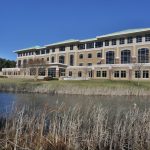Forty complete applications were received for conditional permits to operate as the state’s sole licensed pharmaceutical processor of medical cannabis for a region including the Shenandoah Valley, as well as the cities of Charlottesville and Fredericksburg and the counties of Spotsylvania and Stafford, according to the Virginia Cannabis Control Authority.
Each company paid an $18,000 fee for the opportunity to be granted the sole medical marijuana license to serve the CCA’s health service area 1 (HSA 1), which has been tied up in litigation for years. The HSA 1 region has not had a licensed medical marijuana dispensary available since the state began issuing pharmaceutical processor licenses in 2018.
“This is a pay to try-to-play,” said Eric Postow, Fairfax County-based managing partner for Holon Law Partners. “That really just kind of demonstrates the interest in the business community wanting to service the cannabis sector.” Postow led a team that helped put together an application for Albemarle County-based Integra Vertical to be considered for the HSA 1 license.
The competition also reflects the lucrative nature of the license, which allows licensees to open and operate dispensaries within their designated HSA region. While the CCA doesn’t track sales revenues, the state’s dispensaries made 3.4 million medical cannabis dispensations in 2023. Virginia patients paid an average $14 per gram for medical cannabis flower at dispensaries, compared with $10 in Florida and Pennsylvania, according to a November 2023 market study conducted for the authority.
Virginia Cannabis Control Authority Chief Officer Jeremy Preiss, the agency’s acting head, provided Virginia Business a chart listing the names of applicants on Tuesday. It began with AYR Virginia, which lists a principal address that is shared by AYR Wellness, a Miami-based multistate cannabis business.
Another applicant for the HSA 1 license, Curaleaf Compassionate Care VA, lists a principal address that is also used by Massachusetts-based Curaleaf Holdings, the largest U.S. cannabis company, according to Stash, a New York-based financial services firm.
CLVA, another HSA 1 applicant, lists a Chicago principal address that is also used by Cresco Labs, which Stash ranks as the sixth largest U.S. cannabis company. Another application, Trulieve Virginia, shares an address with Tallahassee, Florida-based Trulieve Cannabis, which Stash lists as the fourth largest U.S. cannabis company.
Pure Virginia, a company connected to Pure Shenandoah, an Elkton-based, family-run CBD and hemp products business is also included on the list. Pure Virginia CEO Tanner Johnson said 40 applicants was on the higher end of what he’d expected, but he’s still optimistic about the chance of his family’s business being selected.
“To us, it didn’t really come down to the competition we were against but how good of an application we could put in, and I think that we put in a really, really good one,” he said. “So, if they want a company from Virginia for Virginians, then it’s going to be hard to pick anyone besides us.”
Mike Tabor, CEO of Integra Vertical in Albemarle County, got his start in medical cannabis two decades ago when a friend was diagnosed with cancer. “I started growing medicine for him, and it all just kind of ballooned from there,” he said. Greenwood-based Jackpot 777 Farms, the company behind Integra Vertical, currently produces hemp flower and CBD-infused products.
“When the opportunity came up and Virginia decided to put HSA 1 up for application, it seemed like an opportune time to make the shift into cannabis,” Tabor said. “I think [that is] a lot of people’s long-term goal in the hemp business anyway.”
The state Cannabis Control Authority plans to name the selected applicant at the end of June, according to Preiss.
Virginia is divided into five health service areas, or HSAs, for regulating medical marijuana.
In September 2018, the Virginia Board of Pharmacy issued five regional pharmaceutical processor licenses for medical cannabis dispensaries.
Dharma Pharmaceuticals opened Virginia’s first dispensary in Bristol in 2020, with three other Virginia HSAs following.
The processor initially given a conditional permit for HSA 1 was PharmaCann Virginia, originally a subsidiary of Illinois-based PharmaCann. However, that permit was revoked in 2020 after the company failed to build a facility by the December 2019 deadline.
PharmaCann Virginia filed suit against the Virginia Board of Pharmacy in Henrico County Circuit Court in September 2020. New applications for conditional permits for pharmaceutical processors in HSA 1 were put on hold during litigation.
In April 2023, Virginia’s Court of Appeals agreed with the circuit court, which rejected PharmaCann Virginia’s argument that the Board of Pharmacy treated it differently than the four other pharmaceutical processors in the state.
The current landscape
Virginia currently has four pharmaceutical processors of medical marijuana owned by three out-of-state companies.
Maryland-based Green Leaf Medical was selected to serve patients in HSA IV, which includes Richmond, while New York-based Columbia Care was tapped to serve HSA V, which includes the Hampton Roads area.
In 2021, Columbia Care bought Green Leaf Medical for $240 million. Columbia Care, which rebranded as the Cannabist Co. in September 2023, has operations in 15 states. It had more than $511 million in revenue in 2023 and reported that Virginia operations made up $16.5% of that number.
Abingdon-based Dharma Pharmaceuticals received the processing license for HSA III, which encompasses Southwest Virginia. Chicago-based Green Thumb Industries purchased Dharma Pharmaceuticals in 2021, reportedly paying about $80 million in cash and stocks. With operations in 14 states, Green Thumb Industries reported a revenue of $1.05 billion in 2023.
Alexandria-based Dalitso received the permit to operate in Health Service Area II, which includes Northern Virginia. In December 2020, Florida-based Jushi Holdings announced it had acquired the 100% of the issued and outstanding equity of Dalitso. In 2019, it reported having paid about $16 million for 62% of the company.
Jushi had a total revenue of $269.4 million in 2023. A spokesperson for Jushi declined to disclose state-by-state revenues.
Messages to Green Thumb Industries asking what percentage of their total revenue came from Virginia operations were not immediately returned.
The Cannabist Co. operates 10 dispensaries in Virginia, while Jushi and Green Thumb Industries both operate six each.
Tabor said he’d like to see the last service area go to a Virginia-owned company and “have some of the revenue directly contribute back into our local economy.”
The CCA contracted with Massachusetts-based Cannabis Public Policy Consulting to complete a report on Virginia’s medical marijuana program, which was released in November 2023. A key finding of the report was that Virginia does not have a track-and-trace system, which allows states to track cannabis from the moment a seed is planted to when a retail sale is made.
In 2022, there were 1,846,313 medical cannabis “dispensations” reported to the Prescription Monitoring Program, according to a spokesperson for the Virginia Department of Health Professions. In 2023, there were 3,356,376 medical cannabis dispensations in the commonwealth.
The CCA has issued a request for proposals for a seed-to-sale tracking system that’s due May 12, with an expedited six-month implementation timeline.
“Once we have seed-to-sale tracking software in place, we will track medical marijuana sales,” Preiss wrote in an email Tuesday.



